
Portugaliae Electrochimica Acta
Scope & Guideline
Exploring the Frontiers of Electrochemical Research
Introduction
Aims and Scopes
- Electrochemical Corrosion Studies:
The journal prominently features research on the electrochemical properties of various materials, particularly metals, under different environmental conditions. This includes studies on corrosion mechanisms, inhibitors, and protective coatings. - Electrochemical Sensors and Analytical Techniques:
There is a strong emphasis on the development and application of electrochemical sensors for the detection and quantification of various substances, including heavy metals, pharmaceuticals, and environmental pollutants. - Nanomaterials and Hybrid Systems:
Research on the synthesis and application of nanostructured materials and hybrid systems in electrochemical applications is a key focus area, highlighting advancements in nanotechnology and materials science. - Sustainable and Green Chemistry:
The journal supports research that aligns with sustainable practices, including the use of eco-friendly materials for corrosion inhibition and the conversion of biomass into valuable products. - Electrochemical Energy Storage and Conversion:
Papers exploring the development of electrochemical devices such as batteries, supercapacitors, and fuel cells, along with their performance and stability, are prevalent.
Trending and Emerging
- Eco-Friendly Corrosion Inhibition:
There is a significant increase in research on eco-friendly and natural corrosion inhibitors derived from plant extracts and sustainable materials, reflecting a global trend towards sustainability in materials science. - Advanced Electrochemical Techniques:
Emerging methodologies such as voltammetry, impedance spectroscopy, and digital simulation techniques are gaining traction, showcasing the journal's commitment to innovative experimental approaches. - Wastewater Treatment and Resource Recovery:
Research addressing the electrochemical treatment of wastewater and the recovery of valuable resources from waste streams is on the rise, indicating a growing interest in environmental applications of electrochemistry. - Nanotechnology in Electrochemical Applications:
The application of nanotechnology, particularly in the development of sensors and catalysts, is increasingly featured in the journal, highlighting advancements in material science and their implications for electrochemical systems. - Sustainable Energy Solutions:
There is an emerging focus on electrochemical systems for energy storage and conversion, particularly in the context of renewable energy technologies, such as batteries and fuel cells.
Declining or Waning
- Traditional Corrosion Inhibitors:
Research focusing on conventional corrosion inhibitors has seen a decrease, as there is a growing shift towards exploring green and eco-friendly alternatives, thus reducing the emphasis on traditional chemical inhibitors. - Basic Electrochemical Theory and Fundamentals:
There has been a noticeable decline in publications centered around fundamental electrochemical theories and principles, as the journal's focus has shifted towards practical applications and innovative technologies. - General Reviews on Corrosion:
While reviews remain important, there is less emphasis on broad, general reviews of corrosion science without specific applications or new insights, as researchers prefer more targeted reviews that address recent advancements and methodologies.
Similar Journals

Analytical & Bioanalytical Electrochemistry
Innovating Analytical Techniques for Tomorrow's ChallengesAnalytical & Bioanalytical Electrochemistry is a pivotal journal dedicated to the advancement of research and innovation in the fields of analytical chemistry and electrochemistry. Published by the University of Tehran, Faculty of Chemistry, Center of Excellence in Electrochemistry, this journal has been contributing to the scientific community since its inception in 2009 and continues to be a critical platform through 2024. With an ISSN of 2008-4226, it focuses on a variety of topics including electrochemical sensors, bioanalytical techniques, and innovative methodologies in electrochemical analysis. Although it currently holds a Q4 quartile ranking in both analytical chemistry and electrochemistry categories, its unique insights and research findings are essential for advancing knowledge and fostering interdisciplinary collaboration within the scientific community. Researchers, professionals, and students engaged in these dynamic fields will find valuable resources and contribute to the ongoing discourse by publishing their work in this journal. We invite you to explore and engage with the diverse content that Analytical & Bioanalytical Electrochemistry offers to enhance your research and professional development.
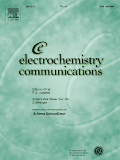
ELECTROCHEMISTRY COMMUNICATIONS
Fostering Innovation through Accessible Electrochemical ResearchELECTROCHEMISTRY COMMUNICATIONS, published by ELSEVIER SCIENCE INC, is a leading journal in the field of electrochemistry, holding a prestigious position in the Q1 quartile since 2023. With an impact factor reflecting its esteemed reputation, the journal ranks #15 out of 60 in the Scopus Chemistry category for Electrochemistry, placing it in the 75th percentile. Since adopting an Open Access model in 2019, it has garnered widespread visibility and accessibility, enabling researchers and professionals to share groundbreaking findings and foster innovation. Covering a wide range of topics from fundamental electrochemical research to practical applications, ELECTROCHEMISTRY COMMUNICATIONS serves as a critical platform for disseminating knowledge and advancing the field. The journal's commitment to quality and relevance positions it as a vital resource for academics and practitioners striving to stay at the forefront of electrochemical science.
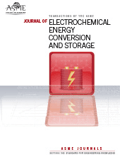
Journal of Electrochemical Energy Conversion and Storage
Elevating Knowledge in Electrochemical InnovationsThe Journal of Electrochemical Energy Conversion and Storage, published by ASME, is a premier platform for cutting-edge research in the fields of electrochemistry, energy engineering, and materials science. With an ISSN of 2381-6872 and an E-ISSN of 2381-6910, this journal aims to disseminate high-quality articles that contribute to the understanding and application of energy conversion and storage technologies. Notably recognized in the 2023 Category Quartiles as Q2 in multiple categories including Electronic, Optical and Magnetic Materials, Energy Engineering and Power Technology, and Mechanical Engineering, it reflects a strong academic impact within its field. The journal also boasts competitive Scopus rankings, highlighting its relevance and influence across disciplines. Operating under an open access model, the journal ensures that research findings are widely accessible, fostering collaboration and innovation among researchers, professionals, and students globally. As we move toward a more sustainable future, the Journal of Electrochemical Energy Conversion and Storage plays a critical role in advancing technologies that promise to reshape how we harness and utilize energy.

CORROSION ENGINEERING SCIENCE AND TECHNOLOGY
Innovating solutions to combat corrosion challenges.CORROSION ENGINEERING SCIENCE AND TECHNOLOGY is a pivotal journal dedicated to the exploration and advancement of corrosion knowledge and technologies, published by SAGE Publications Inc. This esteemed journal holds an ISSN of 1478-422X and an E-ISSN of 1743-2782, and is available for access in the United Kingdom and beyond. With a converged timeline from 2003 to 2024, it continues to publish high-quality research, fostering innovation in the fields of Chemical Engineering, Chemistry, and Materials Science, currently ranked in the Q3 quartile in these categories as of 2023. Additionally, the journal's Scopus rankings—211th in General Chemistry, 145th in General Chemical Engineering, and 266th in General Materials Science—underscore its commitment to disseminating impactful research. As an open-access journal, it invites researchers, professionals, and students to engage with cutting-edge developments in corrosion science, offering insights and solutions critical to numerous industries and enhancing collective academic understanding.
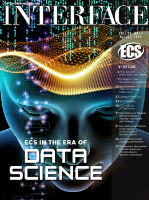
Electrochemical Society Interface
Connecting Cutting-Edge Research with Practical SolutionsElectrochemical Society Interface is a prominent journal within the field of electrochemistry, published by the Electrochemical Society Inc. The journal, carrying the ISSN 1064-8208 and E-ISSN 1944-8783, serves as a vital platform for researchers, professionals, and students alike, aiming to bridge the gap between cutting-edge research and practical applications in the electrochemical domain. With a convergence period spanning from 1992 to 2024, the journal enjoys a respectable ranking in the Q3 Quartile of the 2023 Electrochemistry category. Although it does not currently offer open access options, its articles provide valuable insights into various aspects of electrochemical research and technology, enhancing the scholarly communication in this important field. By maintaining high standards in research dissemination, Electrochemical Society Interface continues to foster innovation and contributes significantly to the developments in electrochemical processes and materials.
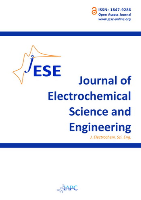
Journal of Electrochemical Science and Engineering
Empowering Global Collaboration in Electrochemical Science.The Journal of Electrochemical Science and Engineering, published by the International Association of Physical Chemists (IAPC), serves as a vital resource for researchers and professionals in the fields of electrochemistry, materials chemistry, and chemical engineering. With an Open Access model since 2011, this journal ensures that groundbreaking research is freely accessible to a global audience, promoting collaboration and knowledge sharing. Situated in Croatia, it showcases cutting-edge developments while focusing on applied aspects related to electrochemical technologies. Notably, the journal holds a commendable Scopus ranking, placing it within the Q3 quartile for multiple categories, including Chemical Engineering (miscellaneous) and Electrochemistry. By fostering innovative research and comprehensive reviews, the Journal of Electrochemical Science and Engineering plays a crucial role in advancing the understanding and application of electrochemical processes, making it an indispensable platform for academics and practitioners alike.
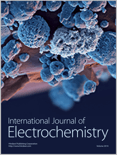
International Journal of Electrochemistry
Pioneering breakthroughs in energy storage and beyond.The International Journal of Electrochemistry, published by HINDAWI LTD, serves as a premier outlet for cutting-edge research in the expansive field of electrochemistry. With an ISSN of 2090-3529 and an E-ISSN of 2090-3537, this open-access journal has been contributing to the advancement of scientific knowledge since 2011, making its content freely available to researchers, industry professionals, and students around the globe. The journal aims to foster innovation by disseminating high-quality research articles, reviews, and technical notes that encompass a wide range of topics from fundamental electrochemical principles to practical applications in energy storage, sensors, and material development. With a focus on promoting interdisciplinary collaboration and advancing the understanding of electrochemical systems, the International Journal of Electrochemistry is a vital resource for anyone involved in electrochemical research and its applications.

Journal of Electrochemical Science and Technology
Advancing the Frontiers of Electrochemical ResearchJournal of Electrochemical Science and Technology, with the ISSN 2093-8551, is a distinguished publication in the field of electrochemistry, disseminated by the Korean Electrochemistry Society. Based in South Korea, the journal has made significant strides since its inception in 2014, showcasing groundbreaking research that spans various applications of electrochemical science. Currently ranked in the Q2 category for Electrochemistry, it occupies an emerging position within the academic community, evidenced by its Scopus rank of #25 out of 60 in the Electrochemistry domain, placing it in the 59th percentile. Although the journal follows a traditional access model, it remains committed to providing high-quality, peer-reviewed content that fuels innovation and scholarly dialogue. With objectives firmly rooted in advancing the understanding and application of electrochemical phenomena, this journal serves as a crucial resource for researchers, professionals, and students alike, striving to push the boundaries of the electrochemical sciences.
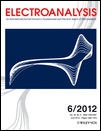
ELECTROANALYSIS
Exploring Cutting-edge Research in ElectroanalysisELECTROANALYSIS is a premier journal published by WILEY-V C H VERLAG GMBH that serves the dynamic field of analytical and electrochemistry. Established in 1989, this scholarly publication has successfully converged its focus to cover a wide array of topics including novel electrochemical methods, sensor technology, and environmental analysis, reflecting the latest advancements and trends in the field. With an impressive 2023 impact factor that places it in the Q2 quartile of Analytical Chemistry and Q3 quartile in Electrochemistry, the journal is recognized for its high-quality research and contributions. Its Scopus rankings further reinforce its credibility, standing at #46/156 in Analytical Chemistry and #26/60 in Electrochemistry. Although currently not offering Open Access, the journal remains a significant resource for researchers, professionals, and students keen to stay at the forefront of electroanalytical techniques. With a global readership, ELECTROANALYSIS continues to drive knowledge and innovation within the scientific community.

JOURNAL OF SOLID STATE ELECTROCHEMISTRY
Driving Progress in Condensed Matter and Electrochemical SystemsThe Journal of Solid State Electrochemistry is a leading peer-reviewed journal dedicated to advancing the understanding and application of solid-state electrochemical systems. Published by Springer, this prestigious journal has been a staple in the field since its establishment in 1997, with an impressive range of topics covering Condensed Matter Physics, Electrochemistry, and Materials Science. It holds a notable Q2 category quartile ranking in several disciplines, including Electrical and Electronic Engineering, and boasts significant Scopus rankings—ranked #28 in Electrochemistry, showcasing its credibility and impact in the field. With a mission to disseminate high-quality research and innovative methodologies, the journal aims to foster cross-disciplinary collaboration among researchers, professionals, and students. While not open access, articles published in the Journal of Solid State Electrochemistry are integral for those exploring cutting-edge technologies through theoretical and practical approaches, ultimately enhancing our understanding of energy systems and materials' performance. Located in Germany, the journal continues to thrive internationally, providing a robust platform for scholarly communication.